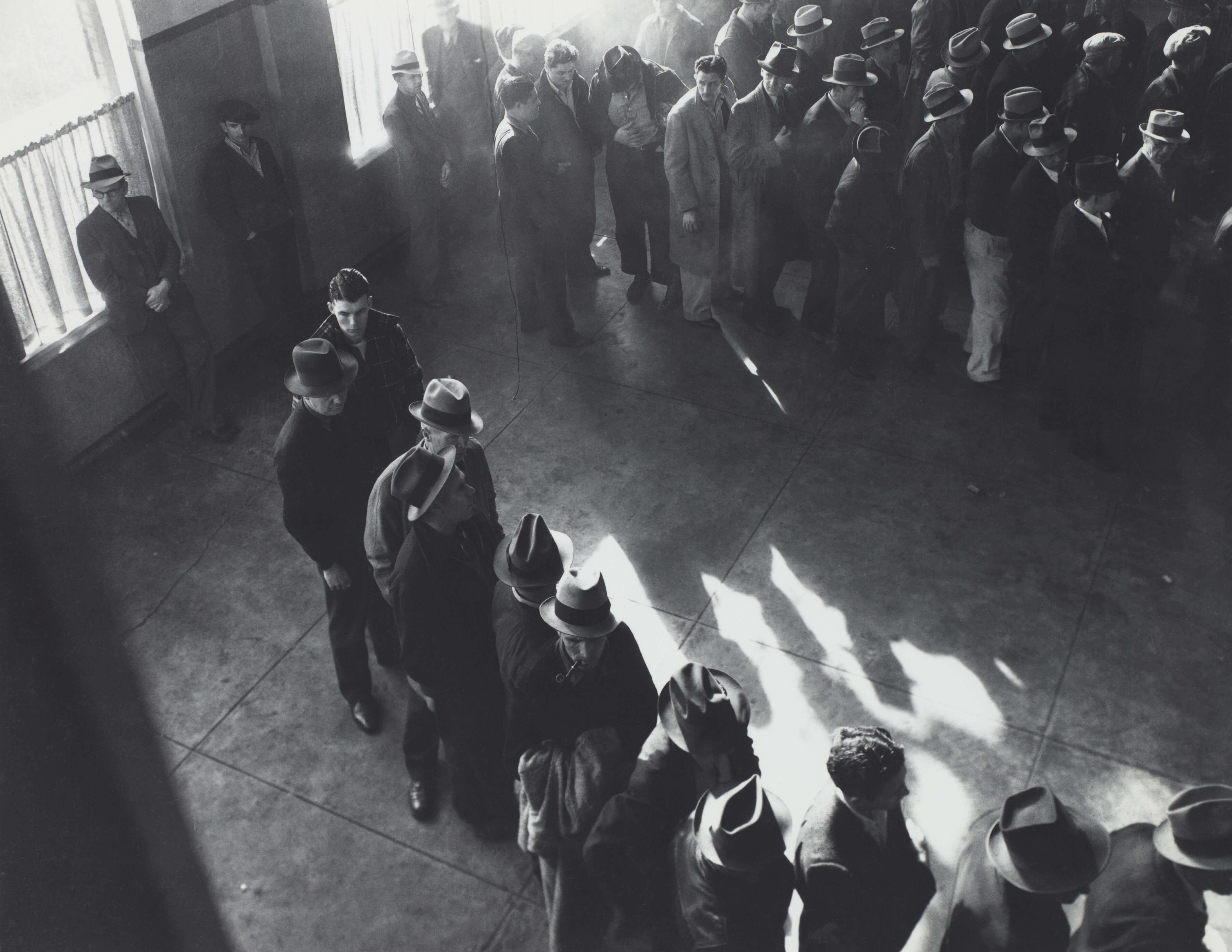Unemployed people line up to register for assistance during the Great Depression, San Francisco, 1938 (photo by Dorothea Lange); most such applications are now done online or by phone.
In three weeks, approximately 17 million Americans filed claims for unemployment insurance. The uptick shattered all previous records, from past recessions. The cause of the mass unemployment is, of course, COVID-19. In response to the coronavirus pandemic, businesses and other employers nationwide have either been ordered to close or decided to substantially cut back operations. The hardest-hit businesses include airlines, hotels, conference centers, restaurants and bars, sports venues, and movie theaters as well as schools and universities. Although firms deemed essential industries continue to operate, the impact is being felt broadly across the economy. The U.S. unemployment rate, which had reached a 50-year low of 3.5 percent before the pandemic, is now projected to top the rate at the height of the Great Depression.
Economic lockdowns have caused an unprecedented pace of layoffs and business closures—particularly impacting low-skilled employees of small businesses. A restaurant, for example, that has had to reduce its business to just takeout or delivery needs far fewer workers to staff its operations. Schools that have closed do not need their regular number of employees on a daily basis. Most of the job losses may end up being temporary, but uncertainty as to when the economy will “reopen” hangs over the heads of decision makers.
On March 27, President Trump signed into law the Coronavirus Aid, Relief, and Economic Security (CARES) Act, aimed at providing widespread relief to the economy. The legislation includes additional funding for the nation’s unemployment insurance system. Unemployment insurance provides workers who lose their job or have their hours reduced, through no fault of their own, with wage-replacement benefit payments for a designated period of time. The system is administered by each state, but eligibility guidelines follow federal regulations. The CARES Act promises an extra $600 per week to workers on unemployment benefits during the COVID-19 pandemic, and the period of eligibility may be extended by up to 13 weeks. Under the new law, up to 39 weeks of assistance is being extended to unemployed workers who are not normally covered by states’ programs. The Families First Coronavirus Response Act, passed earlier in March, provided extra flexibility and additional funding for states’ unemployment agencies.
Under the present circumstances, many workers are unemployed not because they can’t find work but because basically the government has ordered them not to work. Some are waiting until the company they work for reopens; however, others may be out of a job entirely if the business they worked for ends up having to close. While during past economic downturns, rising unemployment was mostly due to weakness in the economy, such as reduced demand for goods and services. The present public health crisis occurred despite a basically strong underlying economy. But the longer it lasts, the more the crisis itself may create hardship.
Image credit: © Science History Images/Alamy
Related Links:
- “It Is Going to Get Much Worse”: U.S. Sheds 701,000 Jobs as COVID-19 Pushes Unemployment to 4.4%
The U.S. economy is shedding jobs like a coronavirus carrier sheds germs.
(Source: Associated Press/Chicago Tribune, April 3, 2020) - COVID-19 Expanded Unemployment: Who’s In and Who’s Out?
This article summarizes the impact on unemployment and the broader U.S. economy from the coronavirus pandemic; includes an assessment of the changes in the CARES Act.
(Source: St. Louis Post-Dispatch, April 6, 2020) - Unemployment Insurance Relief During COVID-19 Outbreak
Official information from the federal government on the CARES Act and unemployment insurance; includes interactive map and listing of all states’ unemployment insurance offices.
(Source: U.S. Department of Labor; accessed April 6, 2020) - 6.6 Million Americans File for Unemployment in Past Week as Coronavirus Continues to Devastate Economy
Brief summary of the second week of record unemployment filings.
(Source: National Review, April 2, 2020)




